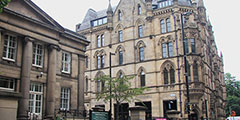“Force is not a remedy.”
– John Bright
The Society of Friends, or Quakers, has a long history of promoting peace and social justice. Quakers had been meeting in Manchester for 200 years before building their first meeting place on this site.
The Society of Friends began as a breakaway group from the Church of England. Quaker beliefs in practical Christianity meant playing active roles in social justice issues such as prison reform. The Society was were dynamic supporters of anti-slavery campaigns, and in 1774 voted to exclude dealers in slavery from membership of their church. When British slavery was abolished in 1833 the Quakers remained active in campaigns to make sure slavery in British colonies was truly at an end, and to abolish slavery in America and elsewhere.
Several key figures in Manchester’s social and political history are linked to the Society, including Richard Cobden and chemist John Dalton.
This House replaced the original building in 1829. Architects Arthur Lane, who later built Manchester’s Corn Exchange, and his pupil Alfred Waterhouse, who would later win the commission to design Manchester Town Hall, were both Quakers.
Meeting Houses are often known as ‘citadels of peace’. Historically, the Mount Street Meeting House has offered a meeting place for those who are concerned with peace and social justice. During the Boer War, meetings held here highlighted the use of concentration camps in warfare. The building has provided a place of peace and safety for those in need: in the chaos of the Peterloo Massacre, the Meeting House provided a vital refuge and first aid post for people fleeing the event.
The Mount Street Meeting House continues to offer a base for local organisations working for peace and human rights, including RAPAR (Refugee and Asylum Seeker Participatory Action Research). This human rights organisation works with people, both locally and abroad, whose human rights are at risk. They support displaced people dealing with housing, deportation, employment, education and other problems. The group is run on an entirely voluntary basis by local and displaced people from all over Greater Manchester. These volunteers come together from many different backgrounds, cultures, histories, experiences and challenges. They represent the rich and diverse community of 21st century Manchester working together to protect social justice.






 1 minute
1 minute